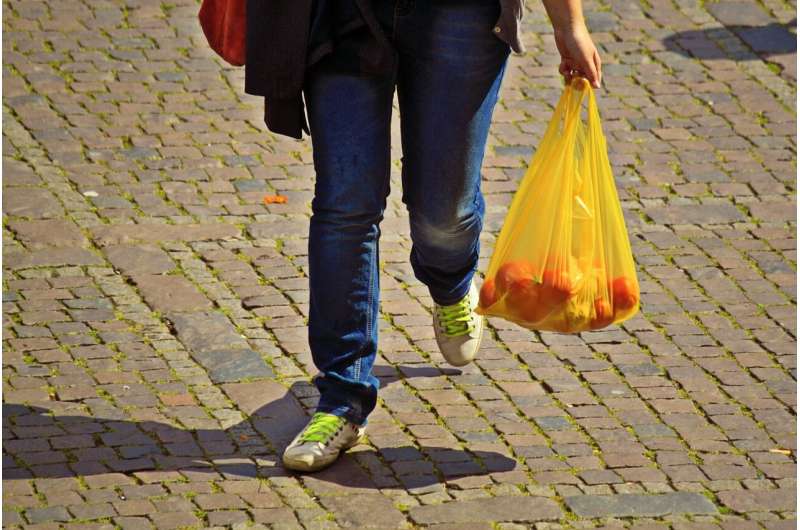This article has been reviewed according to Science X's editorial process and policies. Editors have highlighted the following attributes while ensuring the content's credibility:
fact-checked
trusted source
proofread
Is an end to single-use plastic bags in sight?

Single-use plastics cause pollution, harm wildlife, deplete resources, pose health risks, and create waste management challenges, necessitating urgent action for reduction and better management. A study in the Global Business and Economics Review has identified drivers for the consumer shift away from single-use plastics.
The work conducted by Rajendran Geetha and Chandrasekaran Padmavathy of the Vellore Institute of Technology in Vellore, India, improves our understanding of the factors influencing consumers' decisions to avoid single-use plastic (SUP) bags. The team used Stimulus-Organism-Response (S-O-R) theory to analyze the various external influences and internal motivations.
External factors such as green advertisements, retailer incentives, and government policies were found to play significant roles. Green advertisements were effective in motivating individuals to choose what is commonly referred to as eco-friendly alternatives, while incentives such as discounts and rewards from retailers also encouraged them to avoid SUP bags and opt for reusable cloth and reinforced "bag-for-life" type bags.
Additionally, government policies such as bans and taxes on SUP bags have had a significant impact on consumer choice, emphasizing the importance of regulatory interventions in promoting sustainability and nudging consumers to use alternatives.
The findings provide insights for policymakers, advertisers, retailers, and communities on the importance of environmental messaging and individual perceptions in promoting sustainable behavior. Millions, if not billions, of SUP bags are manufactured every year the world over. Most, as the name would suggest, are used once and then discarded.
Ultimately, they add a heavy burden to the waste stream, and many of those that don't end up in landfills or being incinerated with other waste will reach environmental niches or the seas, where they cause immense problems to different kinds of ecosystems and living things.
Implications drawn from the study suggest a need for a comprehensive approach. Advertisers can use environmental appeals, while retailers can incentivize behavioral change through discounts and rewards. Government and policymakers are urged to implement regulations and awareness campaigns to address plastic pollution effectively.
The study underscores the urgency of addressing environmental challenges and calls for collective efforts to build a sustainable ecosystem. Understanding and acting upon these findings are essential steps toward a greener future.
More information: Rajendran Geetha et al, Effects of external and internal influences on intentions to avoid single-use plastic bags, Global Business and Economics Review (2024). DOI: 10.1504/GBER.2024.136423
Provided by Inderscience




















